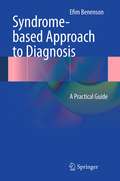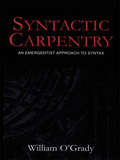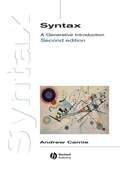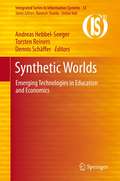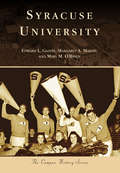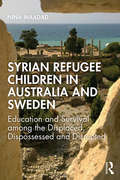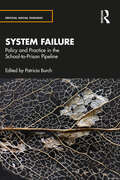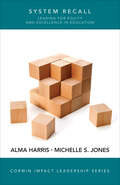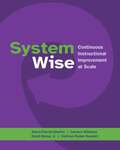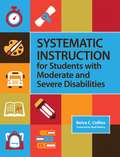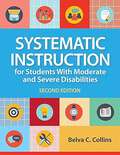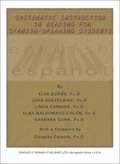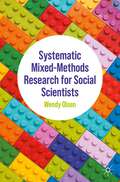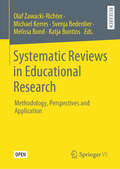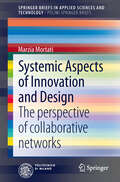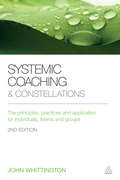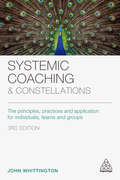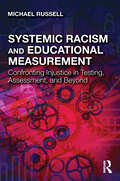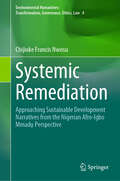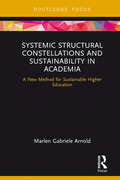- Table View
- List View
Syndrome-based Approach to Diagnosis
by Efim BenensonMany young, inexperienced doctors, have difficultly pinpointing a diagnosis: Is it a condition to which certain diseases could belong, or a disease definable in line with certain criteria? How can I apply my basic knowledge of diseases to a real patient? How can I find the correct diagnosis for a disease that I am seeing for the very first time? The traditional diagnostic pathways conveyed by current methods of teaching, from visual identification of the disease, knowledge of diseases, understanding of symptoms or patterns to diagnosis, leave certain diagnostic questions unanswered, especially on first experience of such a clinical pattern. Syndrome-based Approach to Diagnosis: A Practical Guide offers lecturers an alternative training concept in their teaching, which provides students with a model for self-study as well as the educational tools for learning how to think in clinical terms.
Synesius of Cyrene His Life and Writings: His Life And Writings
by J. C. NicolSynesius was a Greek Bishop of Ptolemais and Neo-Platonic philosopher in the Cyrenaica. His writings are perhaps most notable for the tension they reveal between his Christian and Platonist beliefs. "Synesius pursued his higher studies at Alexandria, where he became a devoted disciple of the famous Hypatia, to whom several of his letters are addressed and for whom he entertained a life-long devotion. After serving sometime in the army he settled in his native land, studying philosophy, mathematics, astronomy, everything; farming, hunting, having many a brush with hordes of pilfering Libyans; and every now and then upholding the cause of someone who had undeservedly fallen into difficulties". This kind of life, in every way suited to his tastes and disposition, was interrupted by a mission to Constantinople, the object of which was to present a gold crown to the new emperor, Arcadius, and obtain alleviation of the burden of taxation. Nearly three years he waited for an audience. The all-powerful Eutropius who sold the provinces to the highest bidder was not the man to allow the emperor to be troubled with complaints. Finally, Synesius obtained an audience and delivered his famous oration "On Kingship". He left Constantinople in 400. According to some authorities before, and according to others after, the mission to Constantinople, Synesius visited Athens. He had described the visit in two letters [54 and 135] to his brother, Euoptius. His reason for undertaking the voyage was, he jestingly said, that "a number of people, priests and private persons, had had revelations in dreams that, unless he did so, some great evil would befall him. Then he would escape the present evils and would no longer have to revere people who had been to Athens and regarded themselves as demigods, and those who had not as demidonkeys or mules." Athens was a disappointment. Like a beast that had been sacrificed, only the hide remained. —Catholic Encyclopedia
Synonyms and Antonyms
by M. ShivaramAn ideal book, guaranteed to help you improve your word power in English Language and prepare well for College tests and other English language proficiency tests- (ELPT) like SAT, GRE, GMAT....
Syntactic Carpentry: An Emergentist Approach to Syntax
by William O'GradySyntactic Carpentry: An Emergentist Approach to Syntax presents a groundbreaking approach to the study of sentence formation. Building on the emergentist thesis that the structure and use of language is shaped by more basic, non-linguistic forces—rather than by an innate Universal Grammar—William O'Grady shows how the defining properties of various core syntactic phenomena (phrase structure, co-reference, control, agreement, contraction, and extraction) follow from the operation of a linear, efficiency-driven processor. This in turn leads to a compelling new view of sentence formation that subsumes syntactic theory into the theory of sentence processing, eliminating grammar in the traditional sense from the study of the language faculty. With this text, O'Grady advances a growing body of literature on emergentist approaches to language, and situates this work in a broader picture that also includes attention to key issues in the study of language acquisition, psycholinguistics, and agrammaticism. This book constitutes essential reading for anyone interested in syntax and its place in the larger enterprise of cognitive science.
Syntax: A Generative Introduction
by Andrew CarnieBuilding on the success of the bestselling first edition, the second edition of this textbook provides a comprehensive and accessible introduction to the major issues in Principles and Parameters syntactic theory, including phrase structure, the lexicon, case theory, movement, and locality conditions.
Synthetic Worlds: Emerging Technologies in Education and Economics
by Torsten Reiners Andreas Hebbel-Seeger Dennis SchäfferSynthetic Worlds, Virtual Worlds, and Alternate Realities are all terms used to describe the phenomenon of computer-based, simulated environments in which users inhabit and interact via avatars. The best-known commercial applications are in the form of electronic gaming, and particularly in massively-multiplayer online role-playing games like World of Warcraft or Second Life. Less known, but possibly more important, is the rapid adoption of platforms in education and business, where Serious Games are being used for training purposes, and even Second Life is being used in many situations that formerly required travel. Linden Lab, creator of Second Life, recently announced the creation of Second Life Enterprise, with customers including IBM, Northrop Grumman, and the US Naval Undersea Warfare Center. The editors of this book captures the state of research in the field intended to reflect the rapidly growing yet relatively young market in education and business. The general focus is set on the scientific community but integrates the practical applications for businesses, with papers on information systems, business models, and economics. In six parts, international authors - all experts in their field - discuss the current state-of-the-art of virtual worlds/alternate realities and how the field will develop over the next years. Chapters discuss the influences and impacts in and around virtual worlds. Part four is about education, with a focus on learning environments and experiences, pedagogical models, and the effects on the different roles in the educational sector. The book looks at business models and how companies can participate in virtual worlds while receiving a return on investment, and includes cases and scenarios of integration, from design, implementation to application.
Syracuse University (Campus History)
by Margaret A. Mason Edward L. Galvin Mary M. O'BrienSyracuse University was founded in 1870 as a private, coeducational university in Syracuse, New York. Classes began the following year in temporary quarters until the university moved to its current location on "The Hill" in 1873, occupying the Hall of Languages, which is still the iconic center of SU. Syracuse University provides a photographic journey from the late 1800s to the present, highlighting its growth from a small Methodist college to a university of national importance with more than 20,000 students and over 240,000 living alumni. Always committed to diversity, SU has embraced opportunity--be it with the Syracuse-in-China program in the 1920s, the enrollment of thousands of veterans after World War II, or cofounding the Say Yes to Education scholarship program for urban schools. Championship football, basketball, and lacrosse teams have also brought prestige to SU, and fans around the nation and world "bleed orange" along with those who work, teach, or study at the university.
Syrian Refugee Children in Australia and Sweden: Education and Survival Among the Displaced, Dispossessed and Disrupted
by Nina MaadadBoth Australia and Sweden are economically, socially and politically well-developed countries and each has responded to the Syrian crisis in its own way with features that define refugee children’s schooling trajectories for transition to life and work. Syrian Refugee Children in Australia and Sweden provides insights into policies influencing the education and schooling of Syrian refugee children in Australia and Sweden. This book uses the perspectives of Syrian refugee children and their voiced experiences to elicit recommendations for education practices and content. Their voices were central to the analysis for the main reason that their viewpoints could contribute in a practical way to the development of pedagogical approaches that would support their schooling, and an effective and productive transition to life in the host countries. The opinions, suggestions and experiences of other stakeholders such as parents, caregivers, teachers and school and state officials, were included for greater understanding so that as many relevant contexts are covered. The recommendations for refugee education proposed in this book will be useful for teachers, principals and policy makers directly involved in educating refugee students and this could positively impact on young refugee students finding their way to a new and better life.
System Failure: Policy and Practice in the School-to-Prison Pipeline (Critical Social Thought)
by Patricia BurchSYSTEM FAILURE provides a framework for understanding the ways in which education policy across organizational settings contributes to the school-to-prison pipeline, as documented in the literature and as observed by authors in empirical studies of justice-involved youth in regular public schools, juvenile court schools, probation settings, and alternative schools. Burch and contributors argue that education policy fails low-income justice-involved youth in three major ways: maintaining silence around issues of structural racism and civil rights, marginalizing youth voice and culture and language, focusing on schools or the criminal justice system, and overlooking intermediate settings including the role of for-profit and not-for-profit education companies. While the problem of the school to prison pipeline has been well documented, the book adds critical detail and description of a policy process that tolerates the school-to-prison pipeline and stalls efforts to abolish it. The book is intended for educators, students, policymakers and practitioners interested in a comprehensive introduction to the policy issues as well as advocates doing serious work on the issues.
System Recall: Leading for Equity and Excellence in Education
by Alma Harris Michelle S. JonesThis book argues that much of what passes as contemporary educational reform in education is faulty and damaging. It argues that it is time for a ‘system recall’ and a need to look at what matters most in the pursuit of educational goals. The book focuses on what we know about contemporary educational improvement, transformation, and change. It will provide insights into what strategies work, long term, to build the capacity for principled change at the school and system level. The book will consider what leaders can do to secure principled school and system improvement which fully embraces diversity, equity, and equality. It will also dispel some myths about reform at scale and challenge some prevailing ideas about educational change that, it will be posited, are not helping many young people to reach their potential. The main argument of the book is that too many school and system improvement initiatives have not paid sufficient attention to equity issues in their pursuit of ever higher achievement and that the net effect of large-scale, international assessments have been to distract policy makers in ways that have not always benefitted young people. The book will use system examples to underpin and exemplify six core ways of re-botting the system and generating progress for all, It will highlight the implications for school and system leaders.
System Recall: Leading for Equity and Excellence in Education
by Alma Harris Michelle S. JonesThis book argues that much of what passes as contemporary educational reform in education is faulty and damaging. It argues that it is time for a ‘system recall’ and a need to look at what matters most in the pursuit of educational goals. The book focuses on what we know about contemporary educational improvement, transformation, and change. It will provide insights into what strategies work, long term, to build the capacity for principled change at the school and system level. The book will consider what leaders can do to secure principled school and system improvement which fully embraces diversity, equity, and equality. It will also dispel some myths about reform at scale and challenge some prevailing ideas about educational change that, it will be posited, are not helping many young people to reach their potential. The main argument of the book is that too many school and system improvement initiatives have not paid sufficient attention to equity issues in their pursuit of ever higher achievement and that the net effect of large-scale, international assessments have been to distract policy makers in ways that have not always benefitted young people. The book will use system examples to underpin and exemplify six core ways of re-botting the system and generating progress for all, It will highlight the implications for school and system leaders.
System Wise: Continuous Instructional Improvement at Scale
by Kathryn Parker Boudett Adam Parrott-Sheffer Carmen Williams David Rease Jr.Actionable and adaptable guidance for extending the proven Data Wise process from the classroom to entire school systems
Systematic Instruction For Students With Moderate And Severe Disabilities
by Belva C. CollinsTo ensure the best outcomes for students with moderate and severe disabilities, K 12 educators need to understand what constitutes good instructional practices and how to apply them in any classroom, with any curriculum. All the how-to guidance they need is in this accessible text on systematic instruction, a highly effective teaching approach rooted in applied behavior analysis. Developed by a seasoned educator who has trained thousands of teachers, this one-of-a-kind textbook fully prepares teachers to use systematic instruction procedures to link core content with critical life skills. Future educators will discover evidence-based methods that help them collect accurate screening and baseline data before instruction effectively use specific systematic instruction procedures make instruction more efficient by weaving non-targeted information into lessons improve students' communication skills through naturalistic language strategies expertly organize and deliver small-group systematic instruction enhance instruction with assistive technology plan successful instructional schedules for students across settings and teachers maximize instruction time by involving peers, paraprofessionals, and service delivery personnel help students maintain new skills and generalize them to other settings An ideal textbook for a wide range of teacher preparation courses, this student-friendly book includes sample lesson plans, chapter objectives, reflection questions, and a glossary. And the practical materials including 20 blank data collection sheets and quick step-by-step charts of instruction procedures make this an invaluable resource for in-practice educators. A comprehensive guide to the why and how of systematic instruction, this is the accessible text teachers need to succeed in inclusive classrooms and improve outcomes for students with moderate and severe disabilities.
Systematic Instruction for Students with Moderate and Severe Disabilities
by Belva C. CollinsTo improve outcomes for students with moderate and severe disabilities, K–12 educators need to understand the why and how of good instructional practices. They’ll find comprehensive guidance in the second edition of this bestselling text on systematic instruction, a highly effective teaching approach rooted in applied behavior analysis (ABA).
Systematic Instruction in Reading For Spanish Speaking Students
by Elva DuranThis text will help in the preparation of primary grade teachers throughout the United States, so that they may be successful with Hispanic students entering public school with little or no English background.
Systematic Instruction of Functional Skills for Students and Adults with Disabilities
by Keith Storey Craig MinerA text on vocational guidance of individuals with disabilities.
Systematic Mixed-Methods Research for Social Scientists
by Wendy OlsenThis textbook provides clear and accessible guidance on the importance and practical application of mixed-methods research. Professor Olsen presents a range of multiple mixed-methods techniques using quantified data. Critical realism underpins key arguments. She offers detailed examples based on wide experience with international applied social-science projects. The book shows readers how to join quantitative and qualitative data together. Detailed methods include: using multiple-level data; constructing new indices based on mixing survey responses and personal interviews; and using focus groups alongside a large survey. The book provides readers with linkages of data between different software packages. It explains the analysis stage in mixed-methods research, interprets complex causality, shows how to transform data, and helps with interpreting social structures, institutions, and discourses. Finally, the book covers some epistemological issues. These include the nature and value of data. The author discusses validity and techniques for ensuring relevant, innovative conclusions. The book also touches on action research as an overarching participatory method.This book is based on clear and explicit definitions, is accessible to students and researchers across disciplines, and shows the appeal of mixed-methods research to those trained in quantitative methods.
Systematic Reviews in Educational Research: Methodology, Perspectives and Application
by Olaf Zawacki-Richter Michael Kerres Svenja Bedenlier Melissa Bond Katja BuntinsIn this open access edited volume, international researchers of the field describe and discuss the systematic review method in its application to research in education. Alongside fundamental methodical considerations, reflections and practice examples are included and provide an introduction and overview on systematic reviews in education research.
Systemic Aspects of Innovation and Design
by Marzia MortatiThe book provides a snapshot of a hot topic - the systemic nature of innovation and its relevance to design - with a trifold perspective: the academic level - the literature on innovation studies and design is often neglected and a clear connection between the two topics taken for granted; the research level - collaborative models are currently considered great opportunities for transforming consumption, production and distribution of goods, but a clear scholarly discourse is still forming; the political level - the European Commission and the OECD are devoting much effort to understanding and measuring the impact of design in innovation processes and firms and a clear contribution would greatly support this path. Thus the book provides an informed, historical and nuanced perspective to the relationship between design and innovation to contribute to all three levels and to propose a point of view that goes beyond aesthetics and meanings.
Systemic Coaching and Constellations
by John WhittingtonSystemic Coaching and Constellations offers a refreshingly uncomplicated path into a potentially complex subject, demonstrating how this approach can provide access to systems and deliver enduring benefits for coaching clients. This new edition offers a comprehensive introduction to the principles that sustain systems, real world descriptions of what systemic coaching is and how it can be useful as well as a step-by-step guide to integrating the principles and practices into coaching. Highly practical, Systemic Coaching and Constellations includes a wide range of exercises for application with individuals and teams. It also includes a brand new chapter on Belonging, fully updated case studies from coaches who have taken part in John's trainings, a joint ICF/EMCC constellation workshop and examples from coaches around the world, including Australia, Mexico, France, Spain, US and the Netherlands. Whether used in an initial selection meeting or to underpin all your coaching conversations and interventions, Systemic Coaching and Constellations offers an accessible, practical starting point to transform your coaching practice.
Systemic Coaching and Constellations: The Principles, Practices and Application for Individuals, Teams and Groups
by John WhittingtonSystemic Coaching and Constellations offers a refreshingly uncomplicated path into a potentially complex subject, demonstrating how to understand and manage intricate relationship systems as part of a powerful coaching agenda. It provides a comprehensive introduction to the principles that sustain systems, how to map and explore them through constellations, as well as a step-by-step guide to integrating these principles and practices into coaching. Featuring a variety of case studies from around the world to illustrate different facilitation styles and approaches, it also contains practical exercises which can be used in a variety of contexts, including one-to-one coaching, group coaching, leadership development coaching and managing conflict in teams.This updated third edition of Systemic Coaching and Constellations contains a new chapter on systemic supervision, new material on team coaching, systemic questions and resourcing constellations as well as new and refreshed case studies and updates to wider research and thinking. Whether used in an initial selection meeting or to underpin all coaching conversations and interventions, it remains an indispensable resource for coaches of all levels of experience and in all remits looking to transform their practice, as well as for those studying coaching as part of a degree or coaching qualification.
Systemic Cognition and Education: Empowering Students for Excellence in Life
by Ibrahim A. HallounThis book offers pedagogic and governance foundations and guidelines for systemic education. It provides an overall systems-based picture of what formal education should be about, and of how things should be carried out in practice, in order to empower students – and teachers – for success in life. It transcends traditional disciplinary education, showing how systemic, praxis immersive, convergence education (SPICE) produces graduates who know how to think outside the box and excel in practical real-life situations. Drawing on philosophy, cognition, and the latest developments in neuroscience, the book calls for systemic pedagogical frameworks that allow for different curricula to be coherently and efficiently designed, and consistently and systematically deployed across different disciplines and various grade levels in the context of mind-and-brain based experiential learning ecologies.This volume is a major design and practice reference for school teachers, university professors, graduate students, along with interested educators, educationists, and stakeholders in various sectors of society.
Systemic Racism and Educational Measurement: Confronting Injustice in Testing, Assessment, and Beyond
by Michael RussellSystemic Racism and Educational Measurement provides a theoretical and historical reckoning with racism and oppression produced through educational measurement and research methodology. As scholars and professionals in the testing, measurement, and assessment of human learning and performance work to exorcise race sciences, white supremacy, and other injustices from the field’s research and practice, new insights are needed into their root causes. This book is the first to posit that the theory of the White Racial Frame was and continues to be applied to the foundations, process, dissemination, and use of educational measurement, leading to instruments, findings, and decisions that perpetuate the racialized social structure of our nation. Even among well-meaning stakeholders who aim to improve humanity and address inequities, the White Racial Frame shapes the field’s research questions, the methods utilized, the data valued, the interpretations made, and the language used throughout. Students and scholars of educational measurement, testing, and psychometrics will find invaluable clarifications of terminology, concepts, and theories integral to understanding systemic barriers in the field; explications of educational measurement’s core purposes and its influence by the White Racial Frame; and a series of alternate frames, theories, and epistemologies intended to guide educational measurement toward anti-racism and increased fairness.
Systemic Remediation: Approaching Sustainable Development Narratives from the Nigerian Afro-Igbo Mmadụ Perspective (Environmental Humanities: Transformation, Governance, Ethics, Law #4)
by Chijioke Francis NwosuSince the issues and discourses surrounding sustainable development entered its phase in our contemporary world, the political, social, economic, ecological, and cultural existence of our modern world has inevitably adopted varied measures to respond better to the demands of our time. This book contributes to the global call for transitions and transformations towards a more sustainable human society. This contribution is specific, dialogic and comparative and also has deep cultural and ethnological consciousness based on the Nigerian experiences and, by extension, the African experience. The research work presents as its background the hypothesis that varied forms of structures—socio-political, socio-economic, socio-ecological and socio-cultural—unite to constitute ‘structural sins’ (John Paul II) and, consequently, the banes to authentic and sustainable development. These dysfunctional structures were critically analysed and evaluated. Furthermore, the research work takes up the contemporary discourse on sustainable development, beginning with earlier development concepts, the impactful contribution of social documents of the church to development discourse, the timeline of the general global and sustainable development approach and governance, as well as the specifics of the twin documents of the year 2015, namely Agenda 2030 and Laudato Si. Again, an indigenised manuscript for development discourse known as Nigeria Vision 20:2020 was examined to delineate the fact that forms of indigenous efforts to discuss and administrate the development process are noticeable. However, such efforts have remained negatively exploited by both internal and external man-made corrupt factors. One such factors discussed in this book, among others, is the failure of Nigeria since independence to stabilise its power and energy sector.
Systemic Structural Constellations and Sustainability in Academia: A New Method for Sustainable Higher Education
by Marlen ArnoldIn order to create truly sustainable universities, we require new methods of visualising and interpreting them holistically as institutions built on complex relationships and systems, rather than as individual departments and people operating independently. This book uses a systemic structural constellations approach to demonstrate how we can build more sustainable higher education institutions, both in terms of teaching and research and at an operational level. Drawing examples from current research and teaching, Systemic Structural Constellations and Sustainability in Academia explores how universities are not only centres of teaching and learning but can also play a crucial role in enabling future decision-makers to appreciate and contribute to a more sustainable future. Providing a clear introduction to systemic structural constellations and guidance on how to practically apply the theory to numerous aspects of the higher education system, this book will be of great interest to students and researchers of education for sustainable development, organisational learning and sustainable management, as well as those tasked with transforming the higher education system for the future.
